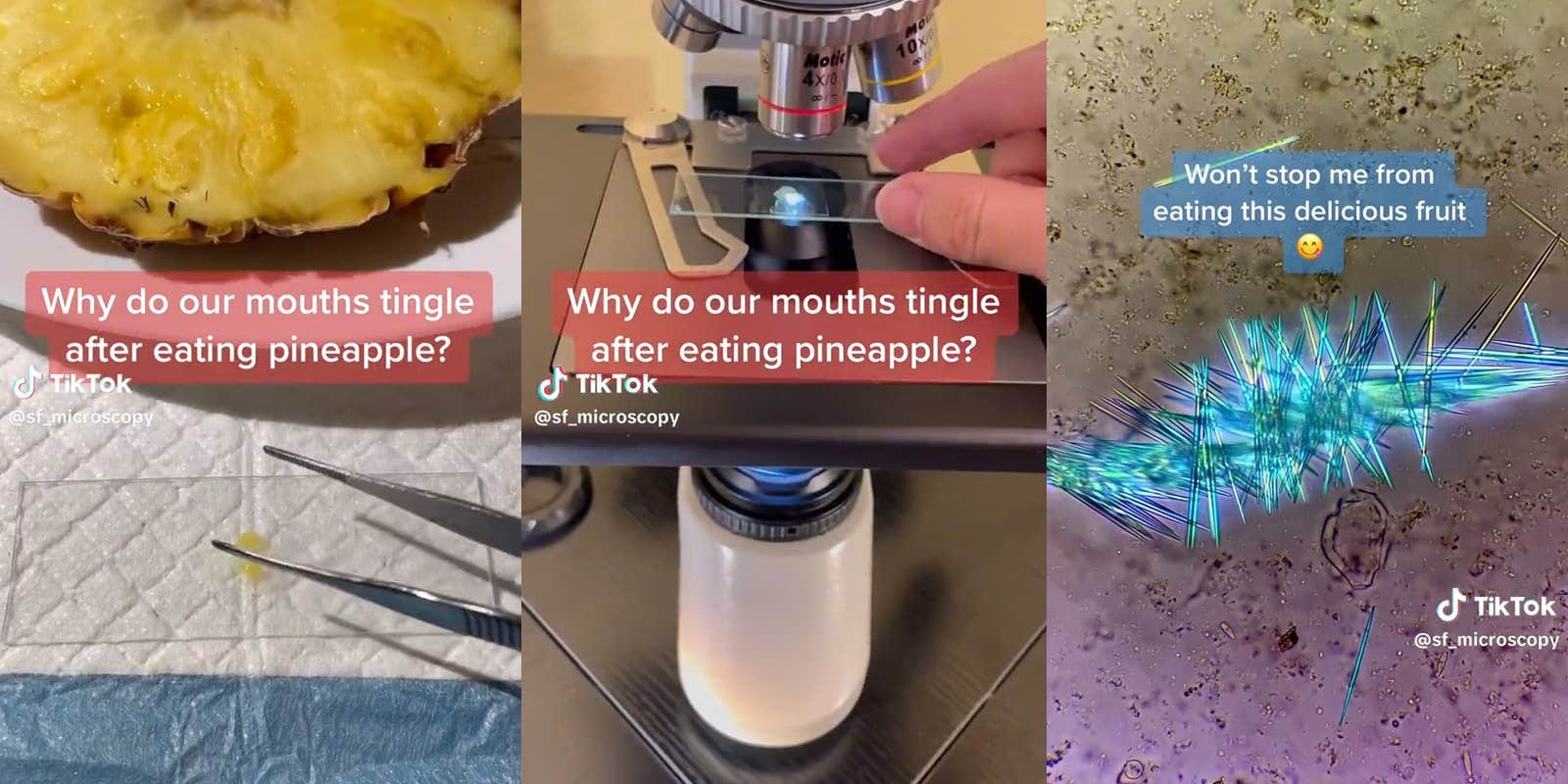Next time you’re snacking on pineapple and your mouth starts to tingle, rest assured: It’s not just a “you” thing.
TikTok creator @sf_microscopy posts videos exploring the “microcosmos”—the world too small to observe with the naked eye. A video posted on May 2 took viewers into the secret world inside your fave tropical fruit.
“Why do our mouths tingle after eating pineapple?” the video’s narration said. “It’s cause we are getting stabbed by thousands of tiny needles called raphides! These crystals of calcium oxalate poke holes in your cell membranes, causing irritation!”
@sf_microscopy One of my favorite fruits is pineapple, but every time I eat them, my mouth tingles. I read that the fruit contains raphides! Kiwis, grapes, taro, and yams also have large amounts of these crystals. These needles serve as a defensive function against insect herbivors to deter them from eating the plant’s fruits and protect the seeds. The needles work with other chemcial substances, like bromelain in the pineapple, to amplify the effects. #microscope #microbiology #underthemicroscope #microscopy #microcosmos #nature #pineapple #crystals #fyp #fypage #fypシ ♬ Sunshine – WIRA
The video currently has 3.8 million likes and 35.7 million views.
According to @sf_microscopy’s caption, “Kiwis, grapes, taro, and yams also have large amounts of these crystals. These needles serve as a defensive function against insect (herbivores) to deter them from eating the plant’s fruits and protect the seeds. The needles work with other (chemical) substances, like bromelain in the pineapple, to amplify the effects.”
The comments section seemed to enjoy the science lesson.
“IT BITES BACK,” one commenter wrote.
“So basically while im eating my pineapple, my pineapple is eating me,” another commented.
“It always feel so raw afterwards this makes so much sense,” someone wrote.
“I ate a lot of pineapple at a wedding once and my mouth felt like fiberglass,” one viewer added.
Things got a little gory: “It made my mouth bleed once,” another wrote.
According to several other sources online, the science more or less checks out.
Fruit company Dole—if they’re not a pineapple authority, who is?—attributes the sensation primarily to bromelain, an enzyme that causes a burning sensation.
“This is one of the substances in pineapple and its function is to break down protein. If pineapple burns the tongue, the enzyme is therefore only ‘doing its job’—in our mouth,” according to Dole. “By the way, this slight burning sensation only occurs with unprocessed fruit. Tinned pineapple is definitely ‘tongue-friendly.’”
What about those spiky lil’ raphides, though? According to a peer-reviewed article by Kotaro Konno, Takashi A. Inoue, and Masatoshi Nakamura published in 2014 by the Public Library of Science, it’s all about synergy. Raphides and bromelain were found to work together as a defense mechanism against insects trying to chow down on plants.
There’s hope for your poor, tingly mouth. Dole recommends grilling or boiling pineapple to counteract the sensation. Bon Appetit’s tips include soaking peeled pineapple in salt water or pairing the fruit with a dairy complement like yogurt.
Some commenters on @sf_microscopy’s video asked about pineapple allergies. According to NY Allergy & Sinus Centers, true pineapple allergies and extreme allergic reactions are rare.
If you’re feeling sufficiently informed about pineapple science, and you’re now craving fruit, make sure to check out the most advanced slicing methods.
As @sf_microscopy wrote about the tingle: “Won’t stop me from eating this delicious fruit.”
The Daily Dot reached out to @sf_microscopy via TikTok on Wednesday and did not receive an immediate response.


